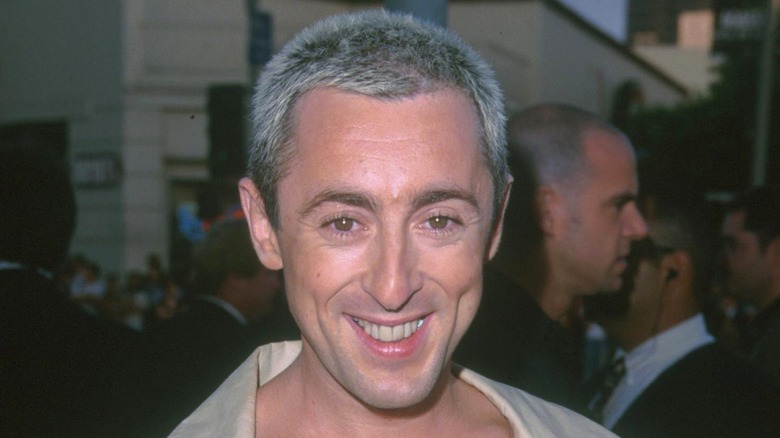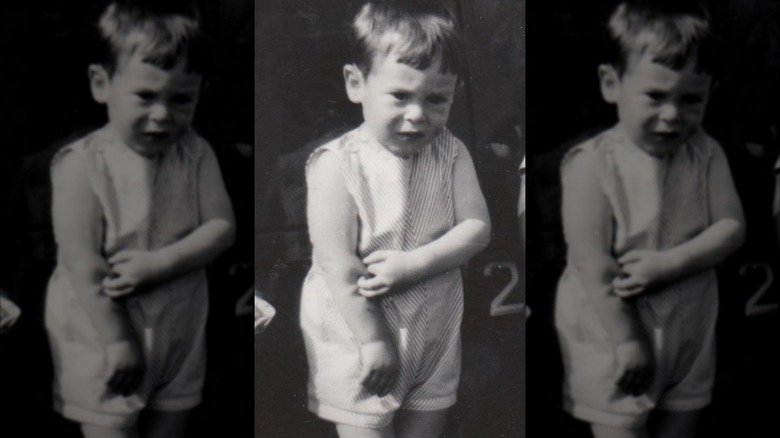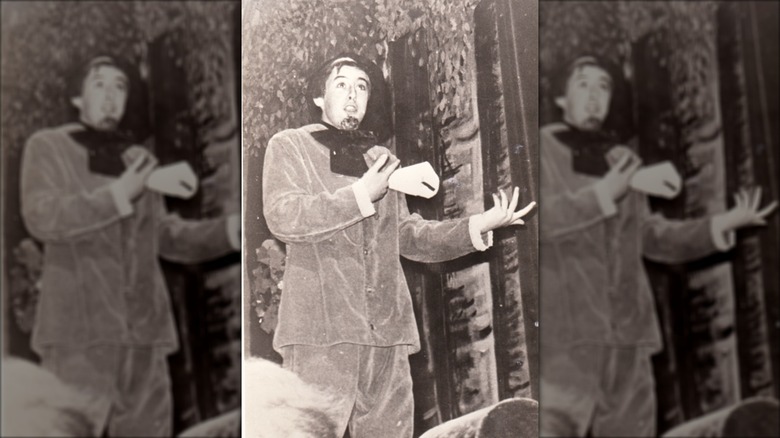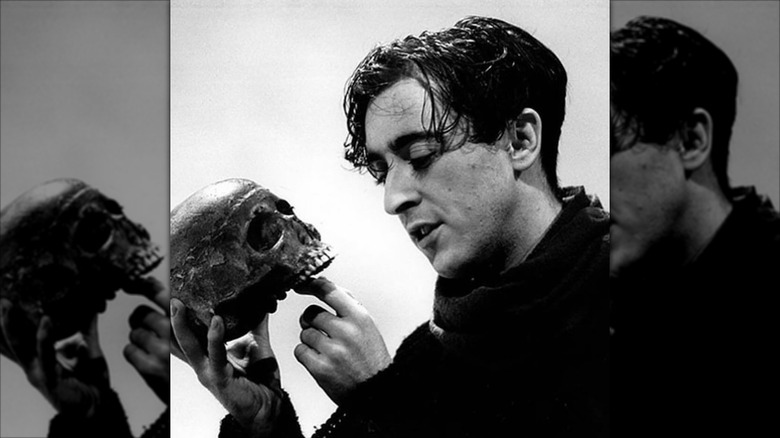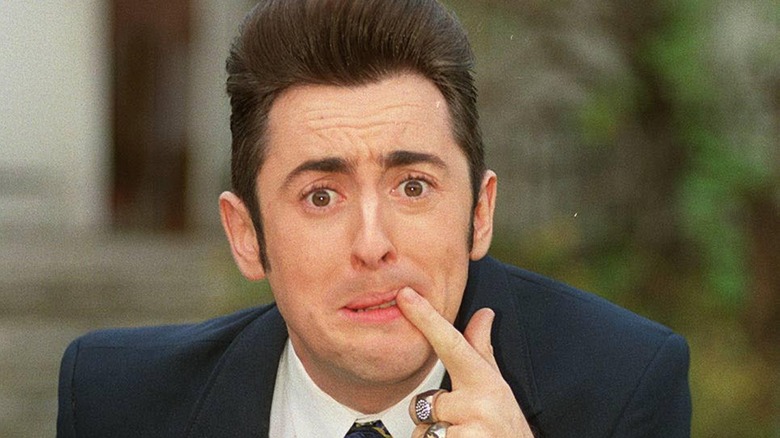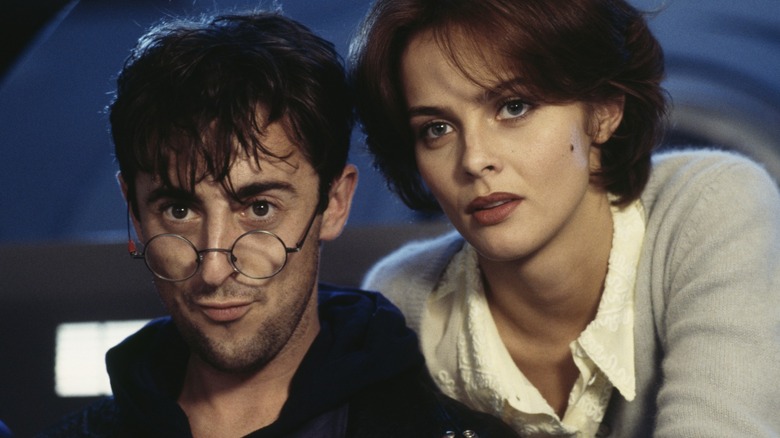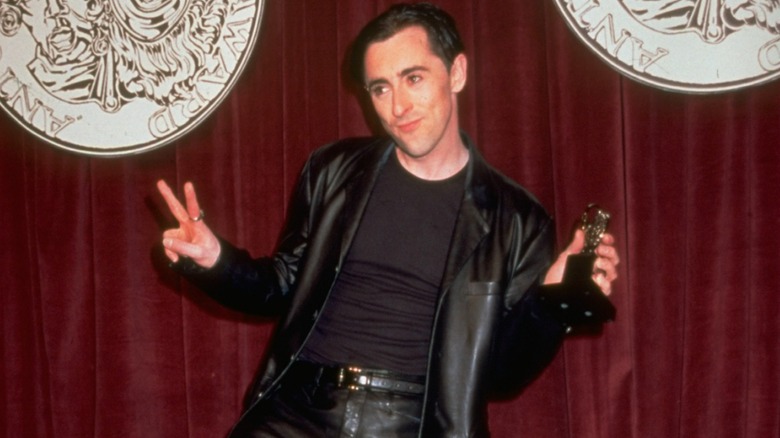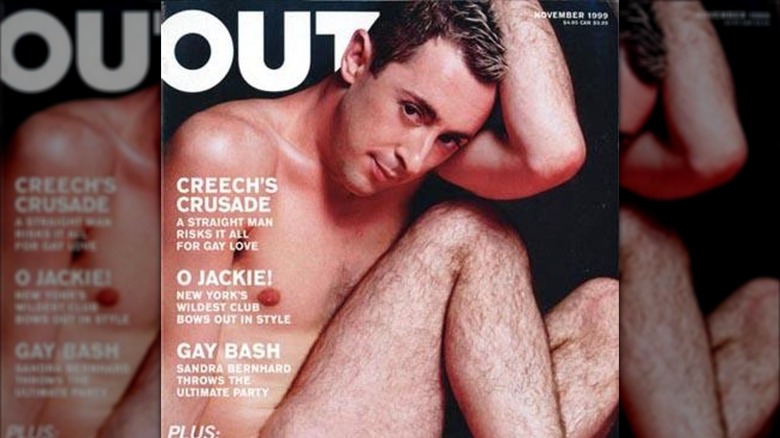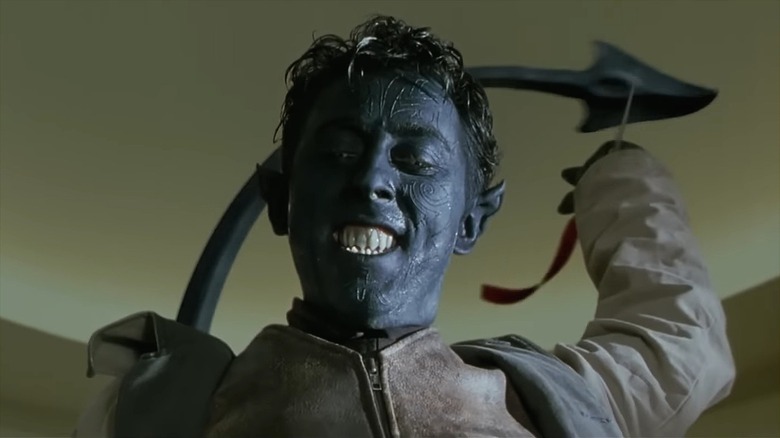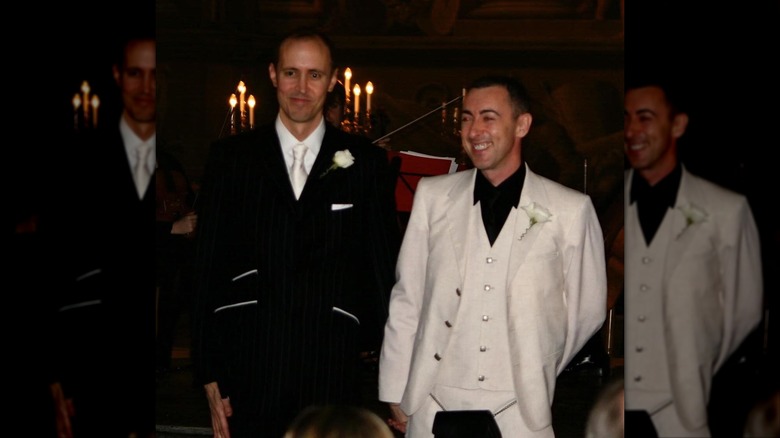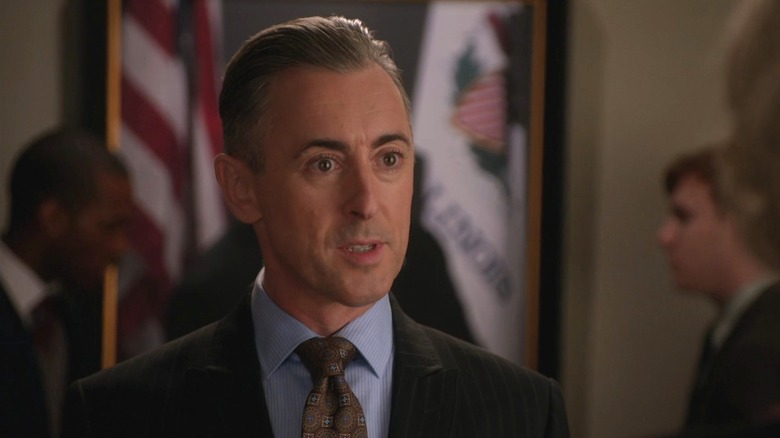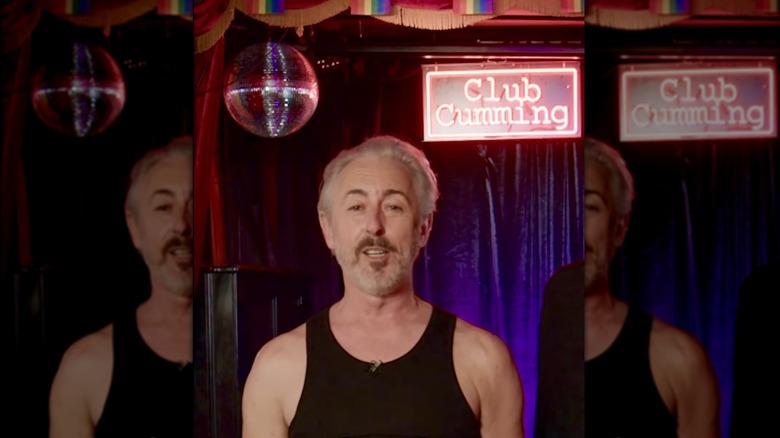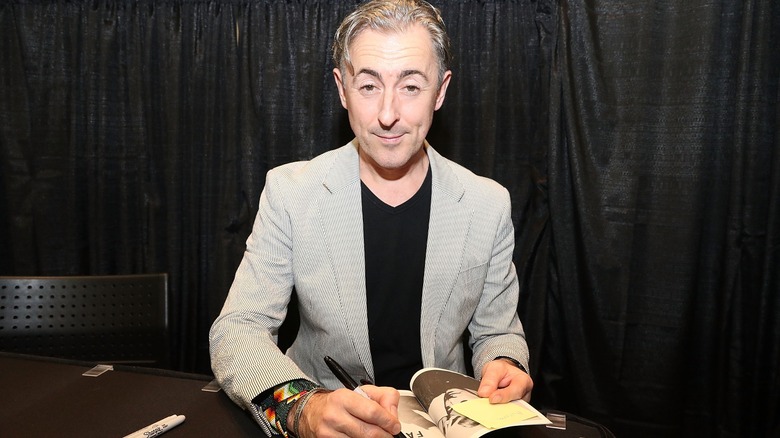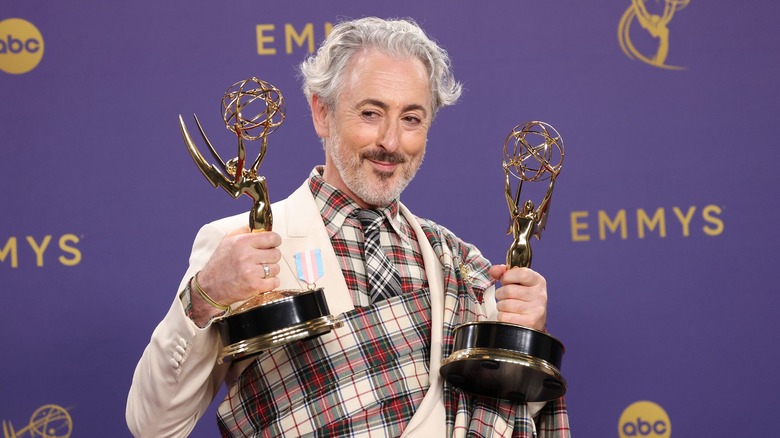The Stunning Transformation Of The Traitors Host Alan Cumming
We may receive a commission on purchases made from links.
Over the course of his career, Alan Cumming has been many things. He's been a cabaret star and the star of "Cabaret," a Bond villain and a superhero, an author, and a business owner. However, Cumming believes his multifaceted career was born out of necessity. "When I was younger, I felt more pressure to be a certain type," he told Wussy Magazine. "But it wasn't even so much that people were saying 'be a type' – it's just that they didn't quite know what to make of me. So I've always just done what I wanted."
That attitude has taken him from the Scottish highlands to the glittering lights of New York City and back again. He was born in difficult circumstances and now leads one of the most successful shows on television, a transformation that has taken many years and many evolutions to get quite right. This is the stunning transformation of "The Traitors" host Alan Cumming.
Alan Cumming was abused by his father as a child
Alan Cumming was born in Scotland, and his childhood was very rough. The future worldwide superstar shared that he was abused by his father when he was younger. "It wasn't just physical. You know, he was violent. But it was also, like, that he did these really weird, sort of sick kind of games," he told NPR in 2021. For example, his father locked him in a circular plant, which is a large metal tube that fills with chemicals to cure wood. The experience left him with nightmares for the rest of his life.
"We all lived in terror," Cumming recalled. "I mean, if you live in terror, it's a sort of paralyzing thing ... There was nothing any of us could have done." Ultimately, his mother divorced his father, but Cumming was left to deal with the ramifications of his father's anger. It would come to define his adolescence, and he would deal with it for years.
One of Alan Cumming's first jobs was writing horoscopes
Alan Cumming began working as a teenager, looking for an excuse to get out of the house. One of his first jobs was working for a media company called DC Thomson, which published several Scottish newspapers. They also had a fiction department, and Cumming was tasked with editing what he later called "bodice-ripping" stories — sexually explicit tales sold in papers of less repute. He also wrote about television for The Dundee Courier.
His favorite job at DC Thomson, however, was writing the horoscopes that would be published in the papers. In an essay for The Big Issue, Cumming recalled, "I just totally made them up." He tried to write something for his expected audience, reasoning, "I thought, who's reading this? What if it's a little old lady who lives alone with her cat. I can't just say 'Mercury is in retrograde and love is on its way.' I would never say that. So I would say, 'Uranus is approaching, so best not to clean those cupboards yet.'"
He began to act as a way to escape his abuse
As a teenager, Alan Cumming was constantly looking for a way to escape from the abuse at home. He told The Big Issue that this led to a double life, explaining, "At the same time as all that was going on, I was having quite a fun time at school with good friends and doing plays and stuff." He threw himself into acting, finding quickly that he had a talent for performance.
Before long, his career began to take off. He was soon part of a comedy duo called Victor & Barry, which he developed with a friend from college, Forbes Masson. The goofy characters were a reaction to what they were learning at school, Cumming told The List — a Scottish outlet called The List, that is. "All the things we have done in our lives that have been the most authentic and the most of our own voices have been the most successful. Victor & Barry has been a metaphor for both of us for finding our own authenticity." They would perform the characters regularly, all around the world, throughout the 1980s.
Alan Cumming divorced his wife in 1994
Alan Cumming got married when he was young — though, not as young as these celebrities who got married as teenagers — and though this may surprise readers familiar with his later life and work, he married a woman named Hilary Lyon. Cumming later revealed that he was looking to prove something to his parents. "That's not a great thing to do. I wouldn't recommend that," he told People. "I was 21 when I got married the first time. I knew I was bisexual when I was married the first time, as did my wife."
Cumming and Lyon even sought to have a child and expand their family, but that didn't wind up happening before their marriage fell apart. He later mused, "I think of it as a blessing that didn't happen because of the way that my life went afterwards and how difficult it would've been." Being a father would've set him on a different path in life, and who knows whether he would've had the same career? "I probably wouldn't have had the inclination to come and live in America, perhaps, if that meant I wasn't going to see my child," he said. "Everything happens for a reason."
Alan Cumming's movie career kicked off in the 1990s when he played a Bond villain
In 1995, Alan Cumming starred in "GoldenEye," the first movie with Pierce Brosnan starring as James Bond. Cumming played Boris Grishenko, a villain memorable for his wicked sense of humor and his circular spectacles. "Like a lot of these kind of action films the plot was quite confusing, even when we were shooting. So, don't expect me to explain it now," Cumming later wrote on his website. "But I do remember Boris' catchphrase — I am invincible! – because strangers still come up and say it to me all the time."
A big action movie like "GoldenEye" presented challenges he wasn't used to. At the end of the film, Grishenko is frozen alive, so Cumming had dry ice poured on his head. It stuck to his scalp, and he had to be rescued by a fireman who hosed him down. "I was okay apart from a few red patches," he wrote, "but it was a near thing."
He cracked America by playing the Emcee in Cabaret on Broadway
After taking the London theater scene by storm, Alan Cumming cracked America by starring in a 1998 revival of "Cabaret." As he'd done in London, Cumming played the Emcee — the gender-bending master of ceremonies who famously bids audiences "wilkommen, bienvenue, welcome" to the Kit Kat Club. Years later, Cumming looked back on "Cabaret" and recalled how overwhelming it was to be a hot new Broadway star. "Everyone would say, 'Your life's gonna change. You have no idea what's gonna happen to you.' And I was like, 'What do you mean?' It's kind of an alarming thing to hear!" he reminisced during a 2019 interview with PeopleTV.
Cumming attracted a lot of attention for the part. "There were stalkers," he told TimeOut. "People would follow me home. My body was plastered across things, and there was a sensationalist aspect in terms of the freedom with sexuality that I was kind of representing."
Ultimately, he was a critical sensation. Accepting the Tony for Best Actor, he joked, "I want to thank everyone that Natasha Richardson thanked, except Liam Neeson" (via YouTube). He went on to shout out his family, looking emotional as he said, "I'd like to thank my Mam and my brother for always being there for me and for being so proud of me."
He came out publicly in the late 1990s
In the late 1990s, after starring in films like "Spice World" and "Romy and Michele's High School Reunion," Alan Cumming decided to go public with his sexuality, which was quite the rarity at that time. "I decided to talk about my sexuality because there was so much speculation and there was no way to talk about it unless you made a big statement and came out," he later recalled to People.
To that end, in 1999, he appeared in the buff on the cover of Out Magazine and declared to the world that he was bisexual. "I had to find a publication that I felt would talk about my sexuality and the nuance of that in a way where I felt I could control the narrative and it wouldn't be sensationalized," he explained.
Cumming feels most comfortable being called "bisexual," refusing pressure to label himself as "gay" just because he primarily has relationships with men. "Because of the archaic tropes about bisexuality, a lot of people don't talk about it, or choose to identify as another [letter] in the [LGBTQ+] acronym," he told Entertainment Weekly, noting that people often call into question whether bisexuality really even exists. "I have always sort of embraced that," he said, "and felt that was where I sat most accurately."
In 2002, Alan Cumming played an iconic superhero
In the early 2000s, Alan Cumming's career reached ever-greater heights. He joined the cast of "Spy Kids," playing Fegan Floop, and the year after that iconic role, he followed it up by joining one the biggest superhero franchises around. In "X2: X-Men United," Cumming played Nightcrawler, a blue mutant who can teleport, phasing through walls and leaping about with no effort.
Although this was one of Cumming's biggest films to date, his experience on the film was not necessarily a positive one. In his memoir "Baggage: Tales from a Fully Packed Life," Cumming noted that director Bryan Singer — who has since been accused of sexual assault several times over — was admittedly abusing painkillers while shooting. "Many mornings I would have been in the makeup trailer for up to five hours being transformed into a blue, teleporting mutant, only to be told I would not be shooting that day after all," he wrote. "Yes, I am complaining."
Years later, Cumming looked back on "X2" and noted that the film's themes of inclusivity and discrimination against minorities really resonated with him. He joked to Entertainment Weekly, "I think the 'X-Men' film I'm in is the gayest film that I've ever done, and that's me saying that." In all seriousness, though, he added, "It's an allegory about queerness, about people having these great gifts and really great, powerful things that they have to hide to exist. Queer people understand what that's all about."
He married Grant Shaffer in 2007
Alan Cumming underwent a head-turning post-divorce transformation in the 1990s, and he spent a long while enjoying the sexual freedom that came with his growing celebrity. In his memoir "Baggage," he wrote about being objectified while starring in "Cabaret" thanks to the risqué promotional photos plastered all around New York City. He liked that, writing, "Here I was as full-blown sex symbol. Geeky, arty, skinny, European, mischievous, slightly dangerous sex symbol, but sex symbol nonetheless ... I did feel sexy, and I was having a lot of sex."
By the latter part of the 2000s, however, Cumming was ready to settle down. He told People, "I'd had a lot of bad failed relationships, and I was ready to not have a bad one." That came in the form of Grant Shaffer, an artist. "I was ready to be honest and open about what I could bring to the table and what I felt I wasn't capable of," he said. "We started our relationship just being very honest with each other."
They married in 2007 and renewed their vows in 2012; after all, same-sex marriages were new, an example of how marriage has changed over the last hundred years. "We first got married in London and then here in New York on our fifth wedding anniversary," he told Instinct. "I think we have a long way to go even though great strides have been made."
His starring role on The Good Wife brought Alan Cumming's career to new heights
Alan Cumming joined the cast of the hit CBS procedural "The Good Wife," starring the stunning Julianna Margulies, in 2010. His hyper-competent political fixer Eli Gold gradually became more and more prominent throughout the show, and Cumming became a fan-favorite cast member thanks to his acerbic wit and his ability to chew through the show's clever dialogue like nobody else. The character was based in part on ruthless Chicago mayor Rahm Emanuel, and Cumming said that he had to do some research to get that kind of vicious politicking exactly right. "I thought of Eli just as I've thought of many other characters I've played that I don't know anything about," he told NPR. "But they tend, mostly, to be superheroes or animals or, you know, kind of mythical characters. So I put him in that same gallery."
Considering the fact that Cumming had spent most of his career playing those larger-than-life, weird, otherworldly, sexually suggestive characters, "The Good Wife" represented a transformation in his career. The character was also far more normal than he was used to, and Cumming viewed the role as a sign of changing times. "The show has changed both my perception and the world's perception of me as an actor. Because now I can play men in suits," he joked to The Guardian. "I've become a grown-up."
The multifaceted performer opened his own New York City club in 2018
Alan Cumming has been a New York City mainstay ever since "Cabaret." In his memoir "Baggage" he wrote, "When I permanently moved to New York City, suddenly I saw everything in my life making sense ... Even on the hottest, sweatiest, slowest, beastliest of summer nights, when no ceiling fan or clanky air conditioner brought relief, I still couldn't imagine anywhere on earth I'd rather be."
In 2018, Cumming made his mark on the city in a new way. That year, he opened Club Cumming, an East Village nightclub and performing arts space. It was inspired by his Studio 54 dressing room, an expansive space where he would throw parties while appearing in a revival of "Cabaret" in the 2010s. He described the club's atmosphere in an interview with The St. Pete Catalyst, explaining, "Club Cumming's byline is 'All ages, all genders, all colors, all sexualities,'" he said. "Everyone is welcome and anything could happen. I've created this space where I want to go. And I think that's a great thing."
On "The View," Cumming insisted that spaces like this are ever more important considering the changing political climate for trans people. "What kind of country are we in where we take rights away from people?" he mused. "I definitely feel it is a safe space. I worry for some of the people who work for us and who come."
Alan Cumming re-processed his past through memoirs and stage shows
Alan Cumming added a new accomplishment to his resume in the 2010s: author. He penned two memoirs that grappled with his childhood and early career, "Not My Father's Son" and "Baggage." The former book dealt with the abuse he suffered at the hands of his father, while the latter focused on his career and the way he was still a work in progress. In an interview with NPR, he explained, "[I] foolishly thought that I would have some sort of closure or something with my dad." Instead, he suddenly found himself talking about his father more than ever. "I just wanted to kind of talk back a little at the notion from the first memoir that somehow I was cured and overcome and I triumphed all my sort of childhood abuse," he said. "I want to say, no, you still have it."
Cumming doesn't just write down stories from his life, he also speaks them aloud onstage. He's toured several one-man shows, including one called "Alan Cumming Is Not Acting His Age." In the show, he ruminated on what it means to grow older, explaining on his website, "I feel I'm still at an age where I can dance till dawn but also be able to dole out some wisdom to my fellow revelers! Wisdom is just being able to recognize the repeating patterns that emerge as you get older and maybe deciding to react to them differently."
Alan Cumming is now the Emmy-winning host of The Traitors
Alan Cumming has pretty much done it all. He's been a stage performer, a movie star, a television mainstay, an entrepreneur, an author, and more. In 2023, he transformed one more time, becoming what he was perhaps always meant to be: a reality television host. Cumming is now the host of "The Traitors," a competition show that sees stars from across the entertainment landscape hole up in a Scottish castle to play a game of intrigue and assassination. The "Schmigadoon!" star presides over the dastardly game of betrayal at breakfast, always equipped with a ridiculous pun that's guaranteed to get a laugh.
The outfits he wears are characters all on their own. They're a bit androgynous, often tartan, flowing, and fabulous. "People are tuning in to see the people they know from these other shows," he told WWD. "[And] they're actually also tuning in to see what sort of crazy femme-y outfit this middle-aged man is going to be wearing."
He's a sensation, and his work won him an Emmy for outstanding host for a reality or reality competition program. For many years, that award had been won by the famous RuPaul Charles of "RuPaul's Drag Race," and when Cumming took the crown, he apologized. On "Late Night with Seth Meyers," Cumming shared that they ran into each other backstage. "I went up to him and I just went, 'I am so sorry.' And he went, 'Condragulations.'"
